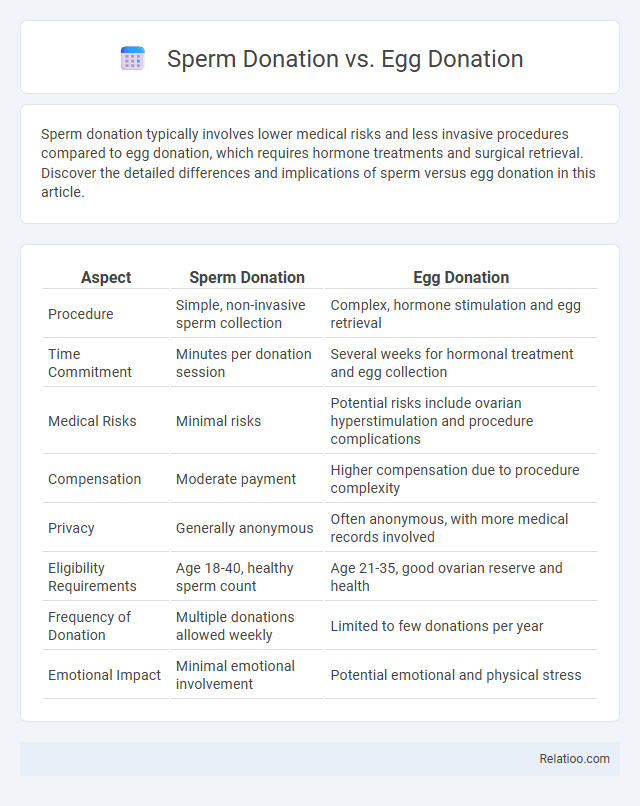Sperm donation typically involves lower medical risks and less invasive procedures compared to egg donation, which requires hormone treatments and surgical retrieval. Discover the detailed differences and implications of sperm versus egg donation in this article.
Table of Comparison
| Aspect | Sperm Donation | Egg Donation |
|---|---|---|
| Procedure | Simple, non-invasive sperm collection | Complex, hormone stimulation and egg retrieval |
| Time Commitment | Minutes per donation session | Several weeks for hormonal treatment and egg collection |
| Medical Risks | Minimal risks | Potential risks include ovarian hyperstimulation and procedure complications |
| Compensation | Moderate payment | Higher compensation due to procedure complexity |
| Privacy | Generally anonymous | Often anonymous, with more medical records involved |
| Eligibility Requirements | Age 18-40, healthy sperm count | Age 21-35, good ovarian reserve and health |
| Frequency of Donation | Multiple donations allowed weekly | Limited to few donations per year |
| Emotional Impact | Minimal emotional involvement | Potential emotional and physical stress |
Introduction to Sperm and Egg Donation
Sperm donation and egg donation are critical components of assisted reproductive technology, enabling individuals and couples to overcome infertility challenges. Sperm donation involves providing male gametes, which are frozen or fresh, for use in intrauterine insemination (IUI) or in vitro fertilization (IVF), while egg donation requires a female donor to undergo hormonal stimulation to retrieve mature oocytes for fertilization. Both processes are medically supervised and offer viable options for those facing male factor infertility, diminished ovarian reserve, or genetic concerns.
Key Differences Between Sperm and Egg Donation
Sperm donation involves providing male gametes, while egg donation requires retrieval of female oocytes, making egg donation a more invasive and time-consuming process. Your choice between sperm and egg donation depends on factors like donor eligibility, medical procedures, and fertility goals. Sperm donation typically requires less preparation and carries fewer health risks compared to egg donation, which involves hormonal stimulation and surgical extraction.
The Donation Process: Step-by-Step
The donation process for sperm, eggs, and fertility treatments involves distinct, carefully regulated steps to ensure safety and success. Sperm donation requires initial screening, collection through ejaculation, and rigorous testing for infections and quality before freezing or immediate use. Egg donation involves ovarian stimulation, monitoring via ultrasound and hormone tests, egg retrieval under sedation, and fertilization or freezing, while fertility treatments encompass diagnosis, ovulation induction or sperm preparation, fertilization techniques like IVF, and embryo transfer, all tailored to your specific reproductive goals.
Eligibility Criteria for Donors
Sperm donation eligibility typically requires donors to be between 18 and 39 years old, in good physical and mental health, with a comprehensive medical and genetic screening. Egg donors generally must be between 21 and 32 years old, possess a normal ovarian reserve, and undergo extensive psychological and hormonal evaluations to ensure fertility potential. Both sperm and egg donors must meet strict criteria regarding personal and family medical history to reduce hereditary risks and ensure high fertility success rates.
Medical Procedures Involved
Sperm donation involves the collection and screening of sperm, typically through masturbation, followed by cryopreservation or immediate use in intrauterine insemination (IUI) or in vitro fertilization (IVF). Egg donation requires ovarian stimulation with hormonal injections, transvaginal ultrasound-guided egg retrieval, and subsequent fertilization with sperm in a laboratory setting before embryo transfer. Fertility treatments encompass a range of procedures including hormone therapy, IUI, IVF, and intracytoplasmic sperm injection (ICSI), each tailored based on underlying reproductive health conditions and the specific contributions of donor gametes.
Psychological and Emotional Considerations
Sperm donation, egg donation, and fertility treatments each carry unique psychological and emotional considerations, including identity questions and potential attachment challenges for recipients and donors alike. You may face feelings of anxiety, hope, and uncertainty surrounding genetic linkage and future contact with donor-conceived children. Support from counseling and open communication is essential for managing the complex emotions throughout the fertility journey.
Legal and Ethical Aspects
Sperm donation, egg donation, and fertility treatments involve distinct legal frameworks that vary by jurisdiction, addressing parental rights, donor anonymity, and consent regulations. Ethical considerations emphasize informed consent, donor compensation, and the welfare of resulting children, with egg donation often facing stricter scrutiny due to medical risks. Legal and ethical protocols ensure transparent practices, protect all parties involved, and uphold reproductive rights in assisted reproduction.
Success Rates and Outcomes
Sperm donation, egg donation, and fertility treatments vary significantly in success rates and outcomes depending on factors like donor quality, recipient age, and underlying infertility causes. Egg donation generally yields the highest success rates, often exceeding 50% per cycle, due to younger donor eggs and better embryo quality. Sperm donation success rates are typically lower but still effective, especially when combined with advanced reproductive technologies, while overall fertility outcomes depend heavily on personalized treatment protocols and reproductive health.
Costs and Compensation for Donors
Sperm donation typically costs between $50 and $100 per donation, with donors receiving compensation around $70 to $125 per donation, depending on the clinic and location. Egg donation involves higher expenses, ranging from $5,000 to $15,000 to cover medical procedures, and donors often receive compensation between $5,000 and $10,000 for their participation. Fertility treatments incorporating donor sperm or eggs vary widely in total cost, with IVF cycles averaging $12,000 to $15,000, not including donor fees, highlighting significant financial considerations for both donors and recipients.
Choosing the Right Donation Option
Choosing the right donation option depends on your specific fertility needs and circumstances, as sperm donation primarily assists with male infertility while egg donation addresses female infertility issues. Understanding the biological roles and success rates of sperm and egg donations can help you make an informed decision tailored to your reproductive goals. Consulting with a fertility specialist ensures your choice aligns with medical advice and increases the chances of a successful pregnancy.

Infographic: Sperm Donation vs Egg Donation
 relatioo.com
relatioo.com